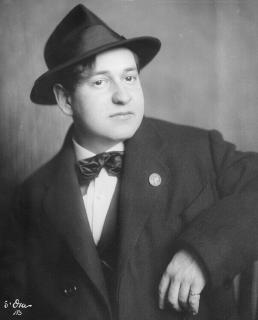Erich Wolfgang Korngold

Korngold was considered a child prodigy in Vienna. At the age of eleven, he caused a sensation by composing the pantomime ballet Der Schneemann, which was performed at the Vienna Court Opera in 1910, choreographed by Carl Godlewski. Since then he has been promoted by the Viennese high aristocracy. At the age of thirteen he wrote piano sonatas; these were followed by a drama overture and a sinfonietta. Performances of his youthful works were often given by prominent musical personalities of the early 20th century such as Bruno Walter, Artur Schnabel, Arthur Nikisch, Wilhelm Furtwängler, Felix Weingartner, and Richard Strauss.
Korngold's opera compositions Der Ring des Polykrates and Violanta (both 1916), Die tote Stadt (1920), Das Wunder der Heliane (1927) had great success in their time and made him - next to Richard Strauss - the most performed opera composer in Austria and Germany. Probably his most significant success was the opera Die tote Stadt.
In 1924 Korngold married Luzi Sonnenthal. In 1926 he received the Art Prize of the City of Vienna.
Korngold felt himself to be a representative of modernism. His Violin Sonata in G Major, Op. 6, had been performed at Schoenberg's Verein für musikalische Privataufführungen on March 9, 1919. However, he never abandoned tonality. In the 1920s he adopted more and more the views of his father, who was an outspoken opponent of musical modernism. Thus, in 1931 he composed the Four Little Caricatures for Children, op. 19, in which he caricatured the styles of Arnold Schoenberg, Igor Stravinsky, Béla Bartók, and Paul Hindemith.
Between 1932 and 1937 Korngold set the basic material of the novel Die Magd von Aachen (Zsolnay Verlag, 1931) by Heinrich Eduard Jacob (1889-1967) to music for the opera Die Kathrin. The libretto or draft text was written by Ernst Decsey (1870-1941). The premiere took place on October 7, 1939, Jacob's 50th birthday, in Stockholm. The opera did not receive its Austrian premiere until October 19, 1950, in Vienna.
In 1934 Korngold accepted Max Reinhardt's invitation to Hollywood to arrange the film music for his film A Midsummer Night's Dream based on Mendelssohn's incidental music. Korngold had already collaborated with Reinhardt in Europe on arrangements of the operettas Die Fledermaus and La Belle Hélène. With his work on A Midsummer Night's Dream, Korngold set new standards in the still young history of film music: he enlarged the orchestra from dance band strength to symphony orchestra strength. He partly intervened in the direction to adapt the actors' speech to the rhythm of the music. In some cases he wrote dialogues himself. Korngold adapted Mendelssohn's music to Reinhardt's dramaturgy, recomposed wide passages in Mendelssohn's style, since Mendelssohn's music was far from sufficient in time, sometimes using motifs from other Mendelssohn works. The reviews of the film prompted Reinhardt not to make another film. Korngold's music was unanimously praised.
Over the next few years, he spent winters in California as a film composer for Warner Brothers. He won an Oscar the following year for the 1936 film Anthony Adverse, and a second in 1938 for The Adventures of Robin Hood. These and his other works became formative for the entire industry. In all, he composed the music for 19 films between 1935 and 1946 (including The Sea Hawk, The Sea Wolf).
At the time of the Anschluss, Korngold was busy in Hollywood working on Robin Hood. His contacts with Warner Brothers enabled him to bring his family and parents to the United States.
In 1946 he largely stopped working on film scores and turned again to classical orchestral music. In 1946 he wrote the Cello Concerto op. 37, and in 1947 the Violin Concerto in D major. Between 1949 and 1951 he stayed in Austria, where he was positively received by the public but not by music critics. During this time, the Symphonic Serenade in B flat major, op. 39, was premiered by the Vienna Philharmonic under Wilhelm Furtwängler, as well as the Silent Serenade, op. 36, both in Vienna. During a second trip to Europe in 1954/55, there was the premiere of his only symphony in F-sharp major, op. 40.
The attempt to return to absolute music after 1946 was largely unsuccessful. His late work was met with strong criticism and in many cases disregard by the contemporary reception in the USA and Europe. Korngold's music subsequently fell increasingly into oblivion. After new editions of his works were published in the USA from 1972 on, Korngold's compositions experienced an international renaissance.
